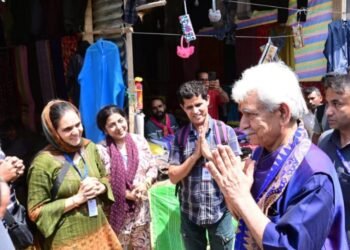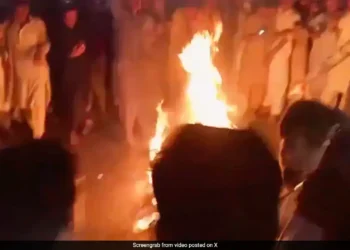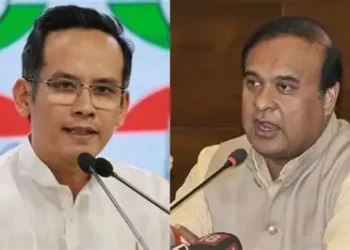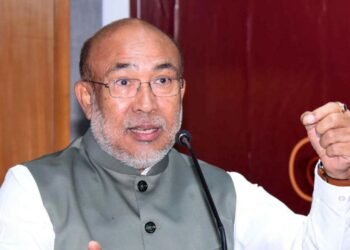A court in Argentina has issued an international arrest warrant for Myanmar’s military chief, Min Aung Hlaing, and 24 others, including Aung San Suu Kyi, for their roles in the 2017 Rohingya genocide. The ruling marks a major step in global accountability for crimes against humanity.
By PC BUREAU
An Argentine court has issued an international arrest warrant for Senior General Min Aung Hlaing, Myanmar’s military chief, for his role in the 2017 genocide against the Rohingya, AFP reports. The court’s ruling, announced Thursday, also names two civilian leaders, including Aung San Suu Kyi, along with 22 other military officials.
Min Aung Hlaing, who has led Myanmar’s military junta since seizing power in a 2021 coup, is at the center of the court’s decision in Buenos Aires. The charges against him include aggravated murder, torture, and sexual violence related to the military’s brutal crackdown on the Rohingya population in Rakhine State, which borders Bangladesh.
The Myanmar junta has not officially responded to the Argentine court’s decision. However, when contacted by VOA, junta spokesperson General Zaw Min Tun dismissed Argentina’s jurisdiction over Myanmar.
A court in Argentina has issued an international arrest warrant for Myanmar’s self-appointed president and junta chief, Senior Gen. Min Aung Hlaing, and other 22 military officials for crimes committed against the Rohingya Muslim minority, activists told RFA.#Myanmar pic.twitter.com/3ivR8x3lHx
— Radio Free Asia (@RadioFreeAsia) February 15, 2025
“Does Argentina even know Myanmar? The Myanmar government knows Argentina. If Argentina wants to legally criticize Myanmar, it must have judicial authority in the country. I suggest you focus on filling your own vacant judicial positions first,” the spokesperson said in a message on the junta’s Viber press group.
Since the case was filed in 2019 under the principle of universal jurisdiction, the junta has consistently rejected Argentina’s involvement, arguing that foreign courts have no authority to prosecute Myanmar’s leaders regarding the Rohingya issue. Universal jurisdiction allows national courts to prosecute individuals for severe crimes that violate international law, regardless of where they occurred.
ALSO READ: Myanmar: Junta Airstrikes Kill 17 Civilians in Sagaing
Legal Efforts and Court Decision
The Burmese Rohingya Organisation U.K. (BROUK), which initially filed the complaint in 2019, welcomed the ruling as a victory for justice.
“This is a victory for the Rohingya and for international justice,” said BROUK President Tun Khin in a Friday press statement. “It shows that no one is above the law, not even military leaders who have committed genocide.”
ALSO READ: COCOMI Sees Prez Rule a Conspiracy to Bolster Kuki militants
Myanmar’s military launched a violent offensive against the Rohingya in Rakhine State in 2017 following insurgent attacks on police outposts. The military’s response included mass killings, sexual violence, and the destruction of villages, forcing over 700,000 Rohingya to flee to neighboring Bangladesh. The United Nations and human rights organizations have classified these actions as genocide.
In late 2023, the International Criminal Court also issued an arrest warrant for Min Aung Hlaing for crimes against humanity.
Controversy Over Civilian Leaders’ Inclusion
While the warrant for Min Aung Hlaing represents a major legal milestone, the decision to include civilian leaders has sparked debate.
In December 2023, BROUK had specifically requested arrest warrants for military officials, presenting evidence of their roles in the genocide. No evidence was submitted for Aung San Suu Kyi, who was Myanmar’s state counselor and de facto leader during the military offensive, or for former civilian President Htin Kyaw.
However, in June 2024, the Argentine prosecutor expanded the request to include both civilian leaders. BROUK then appealed to the court, arguing that the inclusion of civilian leaders did not align with their legal strategy. The court ultimately dismissed the appeal and upheld the prosecutor’s decision.
Aung San Suu Kyi has been imprisoned since the military’s 2021 coup.
Tomas Quintana, an Argentine human rights lawyer and former U.N. special rapporteur for Myanmar, played a key role in the case and explained the court’s reasoning.
“We felt that at this stage in the investigation, it was not appropriate to seek arrest warrants for civilian leaders like Aung San Suu Kyi,” he told VOA’s Burmese Service in an exclusive interview. “But the court sided with the prosecutor, deciding to include civilians in the warrants.”
Quintana noted that while the court initially focused on military officials directly responsible for the genocide, it later expanded the investigation to consider the possible role of civilian leaders.
“This decision marks a shift in international accountability,” he said. “It is the first time Burma [Myanmar] has been held accountable in a court of law for crimes against the Rohingya.”
The investigation, which has spanned four years, is supported by survivor testimonies and documentation from the United Nations Independent Investigative Mechanism for Myanmar. The court’s ruling is expected to lead to an Interpol “red notice,” which would request the detention of Min Aung Hlaing and other Myanmar military leaders worldwide.
Despite the significance of the ruling, Quintana acknowledged that enforcing the warrants would be challenging.
“Myanmar’s military regime controls the country, so executing these warrants remains difficult,” he said. He called for increased international cooperation to hold officials accountable.
“The United Nations and the global community must work together to enforce these decisions.”
While the inclusion of Aung San Suu Kyi in the warrant remains controversial, Quintana emphasized that the ruling represents a crucial step toward justice for the Rohingya people. The case underscores growing global pressure on Myanmar’s military leadership and marks an important precedent in international law.













